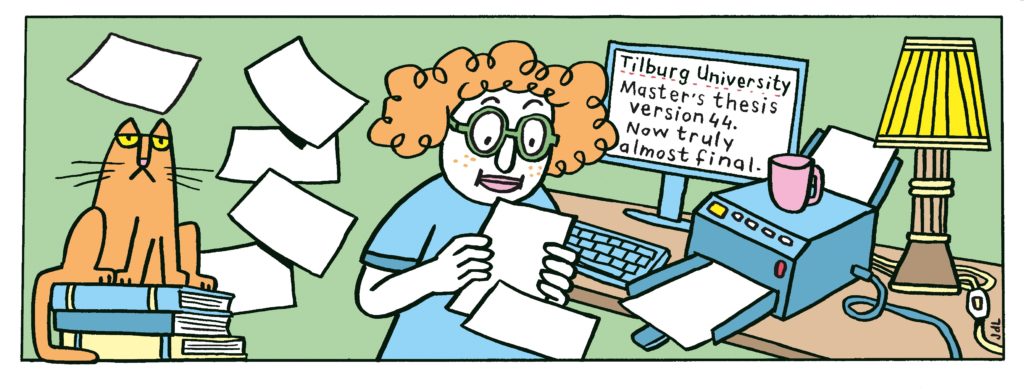Marijn Krol: ‘How do victims experience bullying in the workplace?’
A literature review, experimenting in the lab, or working with SPSS? Tilburg University students write the most diverse theses. In the section Master’s Thesis, Univers highlights one every month. This time: five questions to Marijn Krol. He studied Organization Studies and for his thesis interviewed people who were bullied in the workplace.

Why did you want to research bullying in the workplace?
“Before I started the pre-Master’s in Organization Studies, I did the university of applied sciences program in Human Resources Management. When I was able to choose a Master’s thesis topic related to employees, I immediately found this interesting. But I’ve also had quite a few side jobs, and in that I was always fascinated by group dynamics. The process of when you fit in or have to sweet-talk colleagues a little more interests me enormously. It sometimes happened to me that I didn’t connect that well with a group at work.”
What is your thesis about?
“I examined how victims of workplace bullying experienced bullying. In doing so, I looked at a specific form of bullying: exclusion. The literature on work place exclusion has often been written from the action-reaction perspective. In it, the emphasis is on what the bully does and how the recipient reacts. In twelve qualitative interviews, I explored how the victims experienced the bullying, and how they processed it.
“In the interviews, I asked about the whole story. How did it start? What did the bullies do? And how did the recipients react? They came up with lots of examples. In one respondent’s office, the tables had to be partitioned because of the coronavirus outbreak, and, of course, the bullied person’s table was the only one that just didn’t fit in the same space anymore. Another was skipped at coffee rounds, the only one. They seem like small things, but for all respondents, it appeared that the actions accumulated over time.”
What are your most striking results?
“All the respondents had experienced roughly the same thing, including in the way they experienced and processed bullying. They all went through three phases. In the first, they doubted themselves, and became insecure about the bullying. “Why is someone doing this to me? Then the tipping point came; the moment they realized they were being bullied. The final stage was a period of focusing on themselves. In that phase, those who were bullied were able to face the fact that it was not something they controlled.

“That a tipping point occurs in everyone was not known before. Also, with my research, I was able to clearly visualize the role that the time perspective plays. The tipping point is reached only when a prolonged phase of bullying behavior precedes it, no matter how small the bullying is. Based on these results, I was able to build a model that provides insight into the processes that victims of workplace exclusion go through.
“Finally, almost all respondents indicated that raising or reporting bullying behavior to a confidential advisor does not work if he or she is not one hundred percent independent. An internal confidential advisor often lacks credibility because they are preoccupied by internal dynamics at play in the company. The best thing to do, if you are being bullied, is to report to an organization that specializes in independent confidential advisors. They can help you build a file.”
What else can people who are bullied do?
“For less than one euro download the independent Report App. In this app, they can find a lot of information, keep a log, and contact an external confidential advisor when they are ready. I have looked at many information websites and apps about bullying, and I think this is the best one. Victims are properly supported by this app.
“In addition, I hope my model can help; that it shows what stage they are in. Perhaps it can even make them reach the tipping point because it shows that they don’t have to doubt themselves and it’s not their fault. I know from my interviews that some people who were bullied actively went on the Internet looking for confirmation that it wasn’t their fault.”
Do you have a tip for upcoming thesis writers?
“Think carefully before doing interviews because transcribing is no fun. Anyway, it’s a good idea to think in advance about the time investment you want to make in your thesis. With a standard quantitative data set, you’ll be done in no time. A qualitative study takes much more time but is much more challenging and fun. Both approaches are fine, of course, but it’s good to know that one will buy you time, and the other fun.”
Master’s thesis
Author: Marijn Krol
Title: Experiencing and reacting to workplace exclusion, a receiver’s perspective
Grade: 8.5
Supervisor: Hans van Dijk (TSB)
Translated by Language Center, Riet Bettonviel






